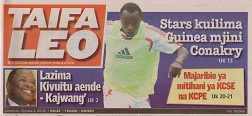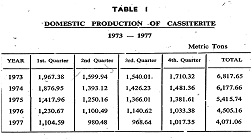From 2004 to 2013, CAMP and the Title VI National Resource Centers for Africa supported projects led by Indiana University to restore and preserve several sets of material related to Liberia. These projects have preserved important documents for future use by scholars and have returned the content to Liberia for use in that country.
Participants
Verlon L. Stone, Indiana University (Project Coordinator)
D. Elwood Dunn, Sewanee: The University of the South
Daniel Reed, Indiana University
G. Narrison Toulee, Center for National Documents and Records/ National Archives, Liberia
Jacob Nadal, Indiana University
Philip Bantin, Indiana University
Preserving the Personal Papers of Liberia President William V. S. Tubman
Overview
Approximately 30,000 documents of Tubman’s personal papers were retrieved from the library of his unoccupied mansion in Liberia and preserved in a 16-month grant project awarded by the British Library Endangered Archives Programme. The materials demonstrate the nearly complete integration between Tubman’s personal and political lives during his presidency from 1944 until his death in 1971. The bulk of the collection clusters at the beginning (1944–50) and end (1961–71) of his administration.
The papers were found in deteriorating condition and in need of immediate preservation efforts. Much of the collection required conservation; in 2003, rebel soldiers rummaged through the file cabinets in search of valuables, tossing folders and papers onto the floor, leaving them limp and damp in Liberia’s tropical climate (for a more detailed report, see “Assessment of Liberian Document Repositories: 2004”).
The project, with £48,810 in funding from Endangered Archives and additional conservation funding from CAMP/Title VI, followed a six-stage process to retrieve, restore, and microfilm the collection before returning it to Liberia. Containers of the damaged papers were sent to the E. Lingle Craig Preservation Laboratory at Indiana University for freeze-drying and conservation. Professional archivists sorted and created finding aids to the collection (Encoded Archival Description). Finally, the collection was microfilmed for preservation (and potential future digitization).
Outcome
To give Liberians local access to the Tubman papers’ content, microfilm copies will be deposited with the University of Liberia, Cuttington University College, Center for National Documents and Records/National Archives, and the Tubman family. International access to the papers’ content are available via microfilms deposited at the Liberian Collections Project–Indiana University, the British Library, and with the Center for Research Libraries. The complete physical collection of the President W. V. S. Tubman Papers will be shipped back to Liberia. The collection will reside at a location in Liberia that is acceptable to the Tubman family and meets the Endangered Archives Programme’s conditions.
For more information and updates, see Indiana University’s page W.V.S. Tubman Papers Collection.
See also IU's “Cooperative Projects (African Studies)” page.
Digitally Publishing the Liberian Government Archives collected by Dr. Svend E. Holsoe
In 2012 and 2013, CAMP and the Title VI Libraries allocated funding to support the digitization of a subset of the Liberian National Archives documents collected by Dr. Svend E. Holsoe. These photocopied documents are uniquely valuable, being the only extant evidence of the original materials, some of which were destroyed by poor storage conditions and others by wartime looting. Duplicate sets of images ingested into a Greenstone Digital Library will be shared via portable hard drives with the Liberian Center for National Documents and Records Agency and the University of Liberia and Cuttington University libraries.
The collection is divided into two parts.
Liberian Government Archives I contains five boxes of materials, 1828-1911, that range chronologically from Liberia’s colonial period under the American Colonization Society through the end of Arthur Barclay’s term as the fifteenth president of Liberia. LGA I consists of correspondence, reports, records, minutes, and other miscellaneous manuscript items. A finding aid for LGA I is available.
Liberian Government Archives II contains twelve boxes materials that range chronologically from 1911-1968, though the bulk of the material focuses on three presidents: Dennis E. Howard, C.D.B. King, and Edwin Barclay. There are also a few materials from William Tubman's presidency, mostly as correspondence dealing with international boundaries after World War II. The collection is divided into three main sections to reflect the three branches of Liberian government: Executive, Legislative, and Judicial. A finding aid for LGA II is available.
Bai T. Moore Papers
Bai T. Moore (1920? - 1987) was a renowned poet and author whose work was greatly influenced by his experiences growing up in Liberia. In addition to Moore’s career as a writer, he served as a government official for several years, first as Chief of the Liberian Bureau of Agriculture, and later, as Deputy Minister of Information, Cultural Affairs and Tourism. This collection consists of government papers, ethnographic materials, published works, manuscripts, and drafts of his writings. The Title VI libraries supported the cost of archival processing and the organization of this collection. A finding aid is available.
William V.S. Tubman Photograph Collection
William Vacanarat Shadrach Tubman (1895-1971) was Liberia’s longest-serving president, in office from 1944 to 1971. During his presidency Tubman travelled extensively, visiting many African countries both pre- and post-independence, Haiti and Trinidad as well as other Caribbean countries, the United States and many European countries. In turn Liberia received frequent return visits by Heads of State and other high-ranking officials. The William V. S. Tubman Photography collection contains over 5,500 photographs, most documenting official functions such as trips, inspection tours, formal receptions and inaugurations. Tubman family member appear in many of the photographs in an official capacity, but the collection also includes family photographs. Most photographs were taken by official photographers for Liberia or the host governments. The collection is available online via Indiana University Liberian Collections.
Papers of Father Christopher K. Kandakai
Remaining funds from other projects were used to acquire and begin processing the personal papers of Father Christopher. K. Kandakai, who was a well-known Liberian linguist who specialized in the Vai language and its indigenous script. Father Kandakai (1928-2011) became an ordained Episcopal priest in 1951 and was Liberia's longest serving Episocpal priest. A finding aid for this collection is available.

